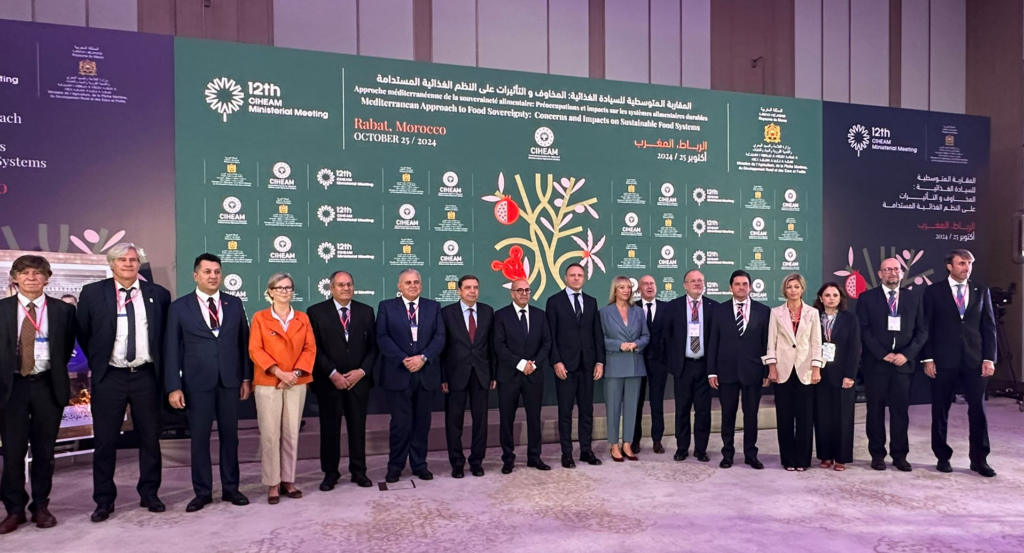
The Minister of Agriculture, Maritime Fisheries, Rural Development, and Water and Forests of the Kingdom of Morocco, Mr. Ahmed EL Bouari, alongside Ms. Frida KRIFCA, President of the International Centre for Advanced Mediterranean Agronomic Studies (CIHEAM), chaired the 12th CIHEAM Ministerial Meeting on Friday, October 25, 2024, in Rabat. The meeting brought together Ministers of Agriculture, including Mr. Luis PLANAS PUCHADES (Spain), Mr. Francesco LOLLOBRIGIDA (Italy), Mr. Anton REFALO (Malta), and heads of delegations from the 13 CIHEAM member countries, as well as representatives of intergovernmental and international organizations. Recorded messages were also shared by Ms. Anila DENAJ, Minister of Albania, and Mr. Abbas AL HAJJ HASSAN, Minister of Lebanon.
This high-level meeting continues the political dialogues initiated by CIHEAM since its establishment, placing sustainable agriculture and food at the heart of Mediterranean cooperation. Amidst a region-wide poly-crisis, these strategic sectors for food security are seen as vital levers for promoting inclusive development and shared prosperity across the Mediterranean region.
The central theme of this edition, “A Mediterranean Approach to Food Sovereignty: Concerns and Impacts on Sustainable Agri-Food Systems,” emphasizes ways to accelerate the transition towards more sustainable and resilient agricultural and food systems, including the “blue transformation,” in response to challenges such as climate change and water scarcity. Special focus is given to the inclusion of rural communities, particularly youth and women, across agri-food value chains.
Since 1962, CIHEAM has been committed to agricultural and rural development in the Mediterranean through training, research, policy dialogue, and international cooperation. The 12th Ministerial Meeting follows in the tradition of CIHEAM’s landmark gatherings, aiming to ensure a Mediterranean dialogue space on strategic and emerging issues and to develop joint solutions to address challenges, drawing particularly on CIHEAM’s expertise in the region.
Notably, the Istanbul Ministerial Meeting (2010) addressed the impacts of climate change on food security; the Valletta Ministerial Meeting (2012) advocated for the development of an agricultural market information system for Mediterranean countries, linked to the AMIS system, to better manage agricultural price volatility; the Algiers Ministerial Meeting (2014) emphasized measures to combat food insecurity, focusing on family farming and human development; and the Tirana Ministerial Meeting (2016) addressed the dynamics of mobility and migration in rural and agricultural areas.
The Kingdom of Morocco is hosting the CIHEAM Ministerial Meeting for the second time. In 2000, Rabat welcomed Ministers from CIHEAM member countries, where they discussed consolidating a common Euro-Mediterranean approach to agricultural trade and the vital role of agricultural product exports for the development of Southern Mediterranean countries.
Twenty-four years later, Morocco once again hosts the CIHEAM Ministerial Meeting at the invitation of Prof. Mohammed Sadiki, the current Minister of Agriculture, Maritime Fisheries, Rural Development, and Water and Forests, who chaired the CIHEAM Governing Board from 2019 to 2023. His continued commitment to CIHEAM as Morocco’s delegate on the Board since 2009, then as Vice-President and President, has contributed to strengthening ties between Morocco and this organization. This fruitful cooperation continues today, reflecting a shared desire to strengthen Mediterranean relations and build a sustainable future for the region.
After discussions on national policies and coordinated regional actions to address common challenges and promote food security across the Mediterranean region, the participants adopted by consensus the final declaration of the 12th CIHEAM Ministerial Meeting.
Through this declaration, Ministers and Heads of Delegation expressed their support for CIHEAM’s initiatives in sustainable food systems, encouraged youth and women to invest in sustainable agriculture and fisheries, and acknowledged the relevance of CIHEAM’s work.